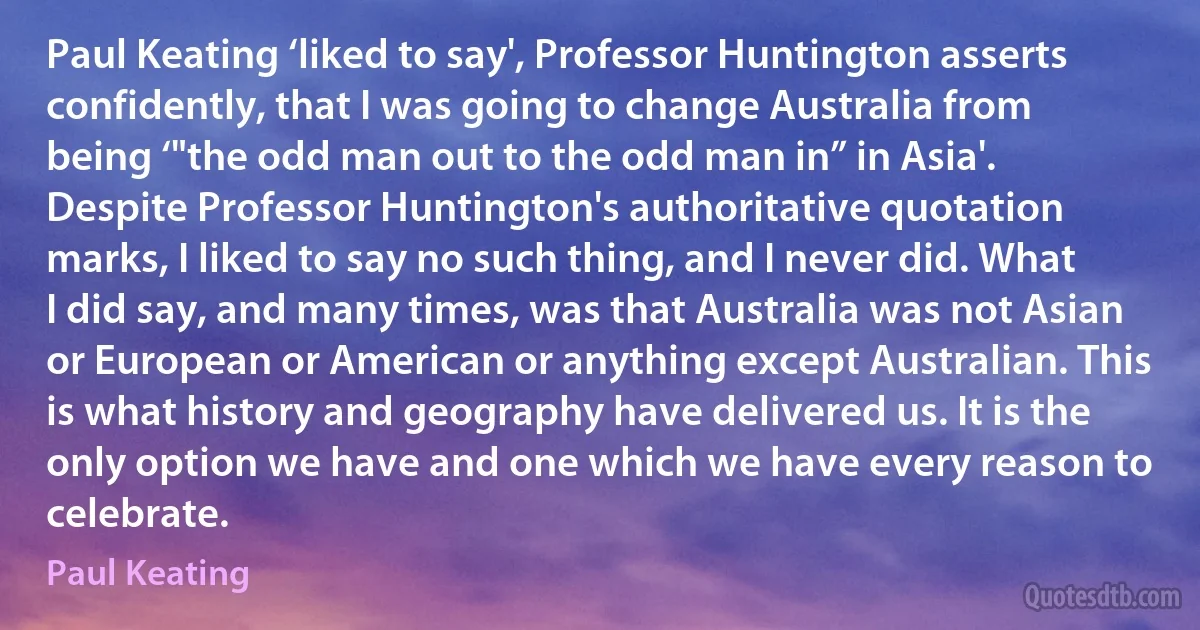Despite Quotes - page 39
Islam has been reborn, in part because of the new material wealth acquired by the Islamic countries, but mainly because of people's conviction that Islam can provide a valid spiritual foundation to their lives. Such a foundation seems to have eluded old Europe, which, despite its enduring political and economic power, seems to be on the road to decline and fall.

Pope Benedict XVI
You're being a lot less courteous than befits a man in your situation.” I thought that underneath the cool I could detect a ragged edge in her voice. Despite her much vaunted self-control, Reileen Kawahara wasn't much better at coping with disrespect that Bancroft, General MacIntyre, or any other creature of power I'd had dealings with. "Your life is in danger, and I am in a position to safeguard it.”
"My life's been in danger before,” I told her. "Usually as a result of some piece of shit like you making large-scale decisions about how reality ought to be run.

Richard Morgan
The essence of Vassar is mythic. Today, despite much competition, it still figures in the public mind as the archetypal woman's college. [...] It signifies a certain je ne sais quoi; a whiff of luxury and the ineffable; plain thinking and high living. [...] For different people, in fact, at different periods, Vassar can stand for whatever is felt to be wrong with the modern female: humanism, atheism, Communism, short skirts, cigarettes, psychiatry, votes for women, free love, intellectualism. Pre-eminently among American college women, the Vassar girl is thought of as carrying a banner. The inscription on it varies with the era or with the ideas of the beholder and in the final sense does not matter - the flushed cheek and tensed arm are what count.

Mary McCarthy
Was DeSean supposed to then say, "Thanks guys, but now that I'm a millionaire, please leave me alone”? Even i he wanted to, he wouldn't have. In desperate times for people who come from desperate communities, your friends become your family. I wouldn't expect DeSean to "distance himself” from anybody, as so many people suggest pro athletes ought to do despite having no understanding of what that means. Going to college and playing in the NFL creates a natural distance, but we can't push people away just because they're not as successful as us. I can't change who I grew up with, but what I can do is try to educate them on the right way of doing things, help them when they need it, and try to keep them out of trouble.

Richard Sherman (American football)
The speed and density of computation have been doubling every three years (at the beginning of the twentieth century) to one year (at the end of the twentieth century), regardless of the type of hardware used. ...Despite many decades of progress since the first calculating equipment was used in the 1890 census, it was not until the mid-1960s that this phenomenon was even noticed (although Alan Turing had an inkling of it in 1950).

Ray Kurzweil
I cannot sufficiently admire the eminence of those men's wits, that have received and held it to be true, and with the sprightliness of their judgments offered such violence to their own senses, as that they have been able to prefer that which their reason dictated to them, to that which sensible experiments represented most manifestly to the contrary. ...I cannot find any bounds for my admiration, how that reason was able in Aristarchus and Copernicus, to commit such a rape on their senses, as in despite thereof to make herself mistress of their credulity.

Galileo Galilei
Christianity is the religion of Europe [...] it is mingled with all our institutions [...] it is the hand of this religion that fashioned these new nations [of Europe]. The cross is on all the crowns, all the codes begin with its symbol. The kings are anointed, the priests are magistrates, the priesthood is an order, the empire is sacred, the religion is civil. The two powers are merged; each lends the other part of its strength, and, despite the quarrels that have divided these two sisters, they cannot live separated.

Joseph de Maistre
"Telling the truth”-which for so long was itself a problematic exercise thanks to competing "truths” and the cost of airing them publicly-now became a virtue in itself. And the bigger the truth you have to tell, the greater your claim upon the attention of fellow citizens and sympathetic observers. Thus, despite the obvious risk of appearing to compete with the ultimate truth of Jewish genocide, speaking openly about hitherto uncomfortable episodes in the recent German past opens the possibility of encouraging the telling of many stories.

Tony Judt
Despite our grandiose ideas and our lofty self-conceits, we are still humble animals, subject to all the basic laws of animal behaviour. Long before our populations reach the levels envisaged above we shall have broken so many of the rules that govern our biological nature that we shall have collapsed as a dominant species. We tend to suffer from a strange complacency that this can never happen, that there is something special about this, that we are somehow above biological control. But we are not. Many exciting species have become extinct in the past and we are no exception. Sooner or later we shall go, and make way for something else. If it is to be later rather than sooner, then we must take a long, hard look at ourselves as biological specimens and gain some understanding of our limitations.

Desmond Morris
And then the burnt houses. How were they burned? I would ask the locals. Back would come a casual reply. 'They belonged to Hindus and Sikhs. Our fathers and uncles burnt them.' But why? 'So they could never come back, of course.' But why? 'Because we were now Pakistan. Their home was India.' But why, I persisted, when they had lived here for centuries, just like your families, spoken the same language, despite the different gods? The only reply was a sheepish grin and a shrugging of shoulders. It was strange to think that Hindus and Sikhs had been here, had been killed in the villages below. In these idyllic surroundings, the killings and burnings seemed strangely abstract to our young minds. We knew, but could not fully understand, and therefore did not dwell on these awful events till much later.

Tariq Ali
The centre of the town was swathed in red flags. It was my first demonstration and one that I remember to this day. The city was Lahore, which for many centuries had been a much envied metropolis in Northern India. Then the last conquerors had departed, leaving behind a divided subcontinent. The old town had become part of a new country – Pakistan. The founder of this state, Mohammed Ali Jinnah, an agnostic, had cynically used religion to create a ‘Muslim nation'. Jinnah had expressed the hope that Pakistan would, despite everything, remain a secular state, but the logic of history had proved fatal. All the Hindu and Sikh families in Lahore had fled across confessional frontiers. Little ‘Lahores' had sprung up in Delhi.

Tariq Ali
The year 1984 was the most painful year for my father. He was deeply hurt both by Operation Blue Star and the anti-sikh riots. His agony was that despite being the supreme commander of Indian defense forces, he was neither consulted before Operation Blue Star nor could he, in spite of his best efforts, stop the riots against innocent Sikhs.

Zail Singh
Debs knew what war does to societies. The very avoidable "Great War" broke the momentum of our nation's rising progressive reform movement, ushered in the era of red-baiting, and directly set the stage for World War II. Most crucially, the aggressive expansion of the American Empire and military state distracted and lowered the expectation levels for American democracy and civic society. Debs knew full well how power structures thwarted the general population's expectations for the good life and paved the way for entrenched austerity and misery, despite a growing gross domestic product.

Eugene V. Debs
I fully understand the men behind Al Qaeda. They have tried to assassinate me twice before. The Pakistan Peoples Party and I represent everything they fear the most - moderation, democracy, equality for women, information, and technology. We represent the future of a modern Pakistan, a future that has no place in it for ignorance, intolerance, and terrorism.
The forces of moderation and democracy must, and will, prevail against extremism and dictatorship. I will not be intimidated. I will step out on the tarmac in Karachi not to complete a journey, but to begin one. Despite threats of death, I will not acquiesce to tyranny, but rather lead the fight against it.

Benazir Bhutto
When the fascist armies had actually invaded Soviet territory and military operations began, Moscow issued the order that the German fire was not to be returned. Why? It was because Stalin, despite evident facts, thought that the war had not yet started, that this was only a provocative action on the part of several undisciplined sections of the German Army, and that reaction might serve as a reason for the Germans to begin the war.

Nikita Khrushchev
Spinoza's views on God, religion and society have lost none of their relevance. At a time when Americans seem willing to bargain away their freedoms for security, when politicians talk of banning people of a certain faith from our shores, and when religious zealotry exercises greater influence on matters of law and public policy, Spinoza's philosophy – especially his defence of democracy, liberty, secularity and toleration – has never been more timely. In his distress over the deteriorating political situation in the Dutch Republic, and despite the personal danger he faced, Spinoza did not hesitate to boldly defend the radical Enlightenment values that he, along with many of his compatriots, held dear. In Spinoza we can find inspiration for resistance to oppressive authority and a role model for intellectual opposition to those who, through the encouragement of irrational beliefs and the maintenance of ignorance, try to get citizens to act contrary to their own best interests.

Baruch Spinoza
The wellspring of courage and endurance in the face of unbridled power is generally a firm belief in the sanctity of ethical principles combined with a historical sense that despite all setbacks the condition of man is set on an ultimate course for both spiritual and material advancement. It is his capacity for self-improvement and self-redemption which most distinguishes man from the mere brute. At the root of human responsibility is the concept of perfection, the urge to achieve it, the intelligence to find a path towards it, and the will to follow that path if not to the end at least the distance needed to rise above individual limitations and environmental impediments. It is man's vision of a world fit for rational, civilized humanity which leads him to dare and to suffer to build societies free from want and fear. Concepts such as truth, justice and compassion cannot be dismissed as trite when these are often the only bulwarks which stand against ruthless power.

Aung San Suu Kyi
The strange American ardor for passing laws, the insane belief in regulation and punishment, plays into the hands of the reformers, most of them quacks themselves. Their efforts, even when honest, seldom accomplish any appreciable good. The Harrison Act, despite its cruel provisions, has not diminished drug addiction in the slightest. The Mormons, after years of persecution, are still Mormons, and one of them is now a power in the Senate. Socialism in the United States was not laid by the Espionage Act; it was laid by the fact that the socialists, during the war, got their fair share of the loot. Nor was the stately progress of osteopathy and chiropractic halted by the early efforts to put them down. Oppressive laws do not destroy minorities; they simply make bootleggers.

H. L. Mencken
Kaka wants AC Milan to sign Steven Gerrard, despite the England midfielder recently agreeing a new contract with Liverpool. The Brazilian said: ‘The time has arrived to re-energise a group which has many players at the end of their contracts. Gerrard is a complete player and can play anywhere. I could see him fitting in really well at Milan."

Steven Gerrard
Another miraculous result of playing Scully has been all the incredible young women I have been blessed to meet along the way--women who have shared that they have received strength from Scully, that because of Scully's strength they have been afraid but done it anyway. These have been women from all walks of life: women from low-income neighborhoods who have persevered despite all odds to study hard and pursue their dreams, enabling them to enter into better schools and work environments; women who have illness and physical challenges who have gotten better and stronger because they believe they can. I truly believe that we can overcome any hurdle that lies before us and create the life we want to live. I have seen it happen time and time again.

Gillian Anderson



